In-Depth Contract Law Case Study: Equitable Estoppel & Agreements
VerifiedAdded on 2023/04/24
|10
|2510
|258
Case Study
AI Summary
This case study provides a comprehensive analysis of several contract law scenarios, examining key legal principles such as promissory estoppel, intention to create legal relations, and the enforceability of social and domestic agreements. The first scenario assesses the validity of a second agreement and its impact on the initial contract, focusing on equitable estoppel. The second scenario explores whether an agreement is social or economic and the effect of a party's death on the promise made. The final scenario investigates the enforceability of a promise made after work completion and the implications of a familial relationship. The analysis draws upon relevant case law, including Central London Property Trust Ltd v High Trees House Ltd, Combe v Combe, Balfour v Balfour, and Roscorla v Thomas, to determine the legal outcomes of each scenario. Desklib offers this and many other solved assignments for students.
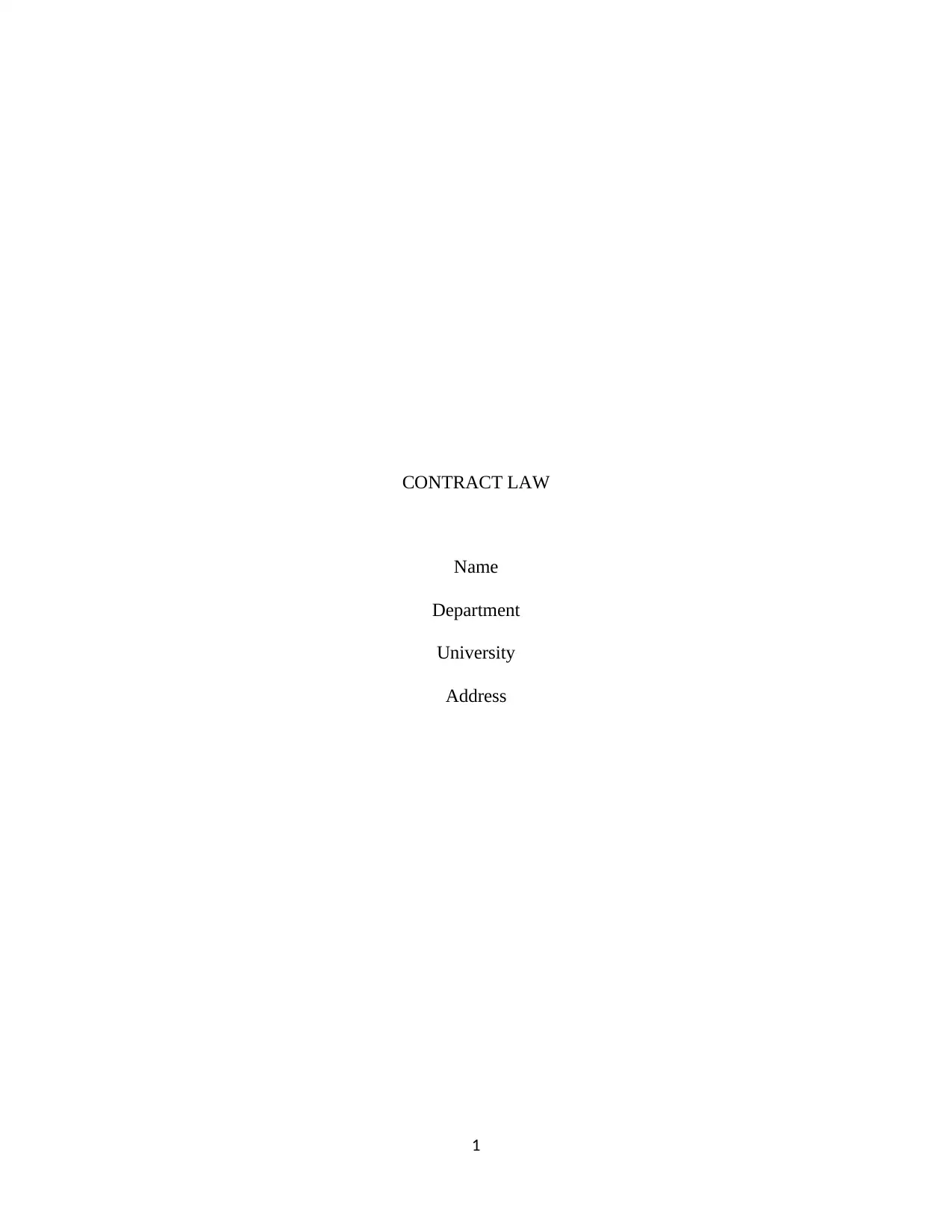
CONTRACT LAW
Name
Department
University
Address
1
Name
Department
University
Address
1
Paraphrase This Document
Need a fresh take? Get an instant paraphrase of this document with our AI Paraphraser
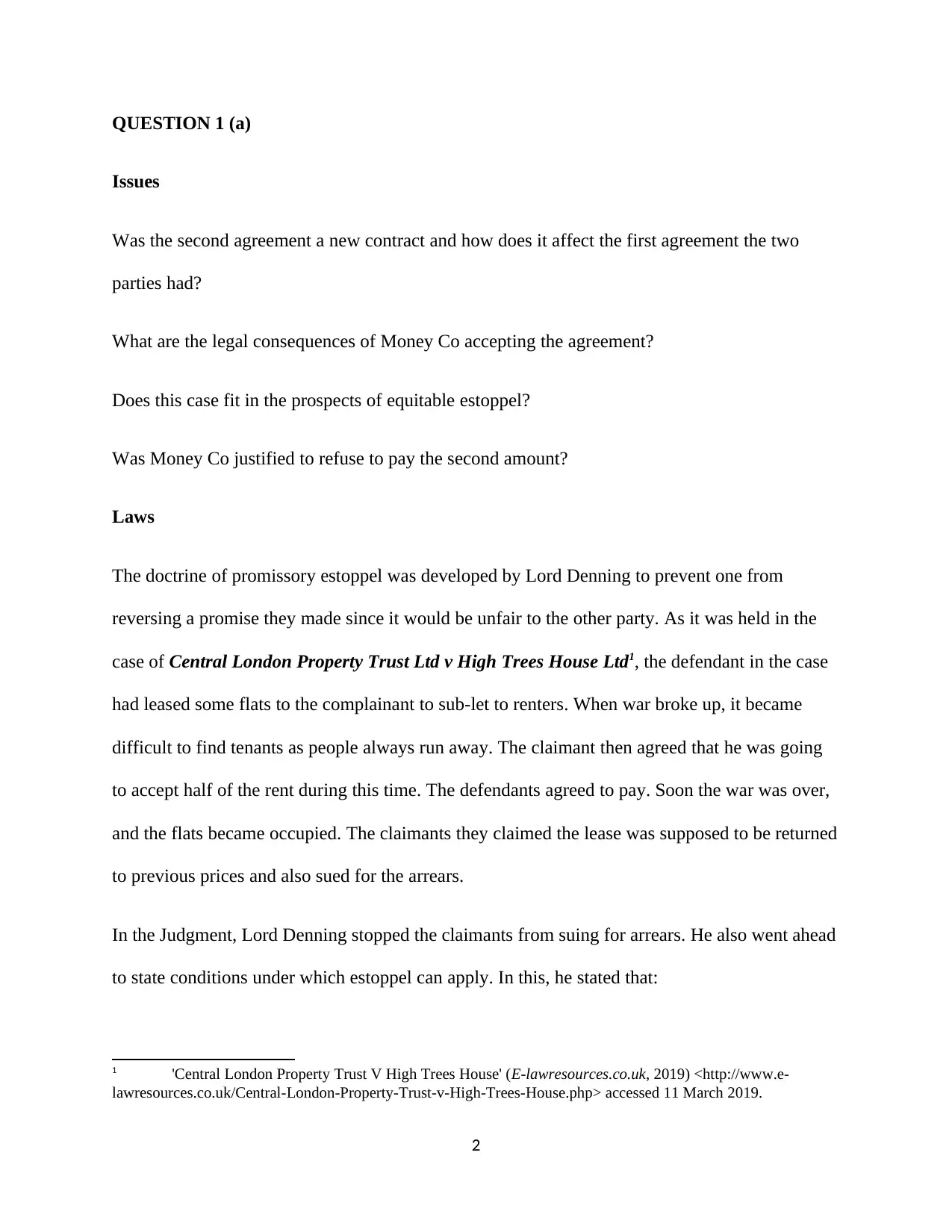
QUESTION 1 (a)
Issues
Was the second agreement a new contract and how does it affect the first agreement the two
parties had?
What are the legal consequences of Money Co accepting the agreement?
Does this case fit in the prospects of equitable estoppel?
Was Money Co justified to refuse to pay the second amount?
Laws
The doctrine of promissory estoppel was developed by Lord Denning to prevent one from
reversing a promise they made since it would be unfair to the other party. As it was held in the
case of Central London Property Trust Ltd v High Trees House Ltd1, the defendant in the case
had leased some flats to the complainant to sub-let to renters. When war broke up, it became
difficult to find tenants as people always run away. The claimant then agreed that he was going
to accept half of the rent during this time. The defendants agreed to pay. Soon the war was over,
and the flats became occupied. The claimants they claimed the lease was supposed to be returned
to previous prices and also sued for the arrears.
In the Judgment, Lord Denning stopped the claimants from suing for arrears. He also went ahead
to state conditions under which estoppel can apply. In this, he stated that:
1 'Central London Property Trust V High Trees House' (E-lawresources.co.uk, 2019) <http://www.e-
lawresources.co.uk/Central-London-Property-Trust-v-High-Trees-House.php> accessed 11 March 2019.
2
Issues
Was the second agreement a new contract and how does it affect the first agreement the two
parties had?
What are the legal consequences of Money Co accepting the agreement?
Does this case fit in the prospects of equitable estoppel?
Was Money Co justified to refuse to pay the second amount?
Laws
The doctrine of promissory estoppel was developed by Lord Denning to prevent one from
reversing a promise they made since it would be unfair to the other party. As it was held in the
case of Central London Property Trust Ltd v High Trees House Ltd1, the defendant in the case
had leased some flats to the complainant to sub-let to renters. When war broke up, it became
difficult to find tenants as people always run away. The claimant then agreed that he was going
to accept half of the rent during this time. The defendants agreed to pay. Soon the war was over,
and the flats became occupied. The claimants they claimed the lease was supposed to be returned
to previous prices and also sued for the arrears.
In the Judgment, Lord Denning stopped the claimants from suing for arrears. He also went ahead
to state conditions under which estoppel can apply. In this, he stated that:
1 'Central London Property Trust V High Trees House' (E-lawresources.co.uk, 2019) <http://www.e-
lawresources.co.uk/Central-London-Property-Trust-v-High-Trees-House.php> accessed 11 March 2019.
2
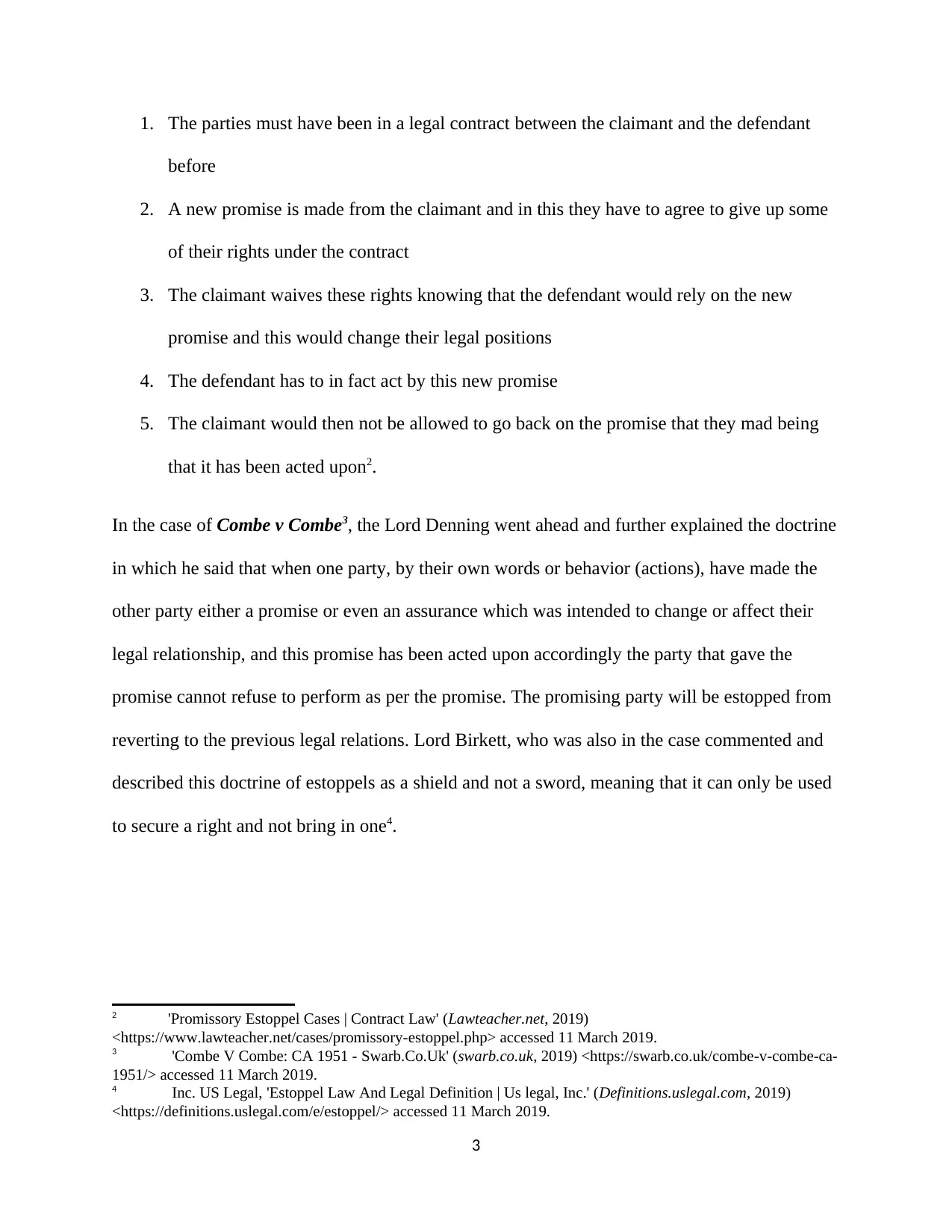
1. The parties must have been in a legal contract between the claimant and the defendant
before
2. A new promise is made from the claimant and in this they have to agree to give up some
of their rights under the contract
3. The claimant waives these rights knowing that the defendant would rely on the new
promise and this would change their legal positions
4. The defendant has to in fact act by this new promise
5. The claimant would then not be allowed to go back on the promise that they mad being
that it has been acted upon2.
In the case of Combe v Combe3, the Lord Denning went ahead and further explained the doctrine
in which he said that when one party, by their own words or behavior (actions), have made the
other party either a promise or even an assurance which was intended to change or affect their
legal relationship, and this promise has been acted upon accordingly the party that gave the
promise cannot refuse to perform as per the promise. The promising party will be estopped from
reverting to the previous legal relations. Lord Birkett, who was also in the case commented and
described this doctrine of estoppels as a shield and not a sword, meaning that it can only be used
to secure a right and not bring in one4.
2 'Promissory Estoppel Cases | Contract Law' (Lawteacher.net, 2019)
<https://www.lawteacher.net/cases/promissory-estoppel.php> accessed 11 March 2019.
3 'Combe V Combe: CA 1951 - Swarb.Co.Uk' (swarb.co.uk, 2019) <https://swarb.co.uk/combe-v-combe-ca-
1951/> accessed 11 March 2019.
4 Inc. US Legal, 'Estoppel Law And Legal Definition | Us legal, Inc.' (Definitions.uslegal.com, 2019)
<https://definitions.uslegal.com/e/estoppel/> accessed 11 March 2019.
3
before
2. A new promise is made from the claimant and in this they have to agree to give up some
of their rights under the contract
3. The claimant waives these rights knowing that the defendant would rely on the new
promise and this would change their legal positions
4. The defendant has to in fact act by this new promise
5. The claimant would then not be allowed to go back on the promise that they mad being
that it has been acted upon2.
In the case of Combe v Combe3, the Lord Denning went ahead and further explained the doctrine
in which he said that when one party, by their own words or behavior (actions), have made the
other party either a promise or even an assurance which was intended to change or affect their
legal relationship, and this promise has been acted upon accordingly the party that gave the
promise cannot refuse to perform as per the promise. The promising party will be estopped from
reverting to the previous legal relations. Lord Birkett, who was also in the case commented and
described this doctrine of estoppels as a shield and not a sword, meaning that it can only be used
to secure a right and not bring in one4.
2 'Promissory Estoppel Cases | Contract Law' (Lawteacher.net, 2019)
<https://www.lawteacher.net/cases/promissory-estoppel.php> accessed 11 March 2019.
3 'Combe V Combe: CA 1951 - Swarb.Co.Uk' (swarb.co.uk, 2019) <https://swarb.co.uk/combe-v-combe-ca-
1951/> accessed 11 March 2019.
4 Inc. US Legal, 'Estoppel Law And Legal Definition | Us legal, Inc.' (Definitions.uslegal.com, 2019)
<https://definitions.uslegal.com/e/estoppel/> accessed 11 March 2019.
3
⊘ This is a preview!⊘
Do you want full access?
Subscribe today to unlock all pages.

Trusted by 1+ million students worldwide
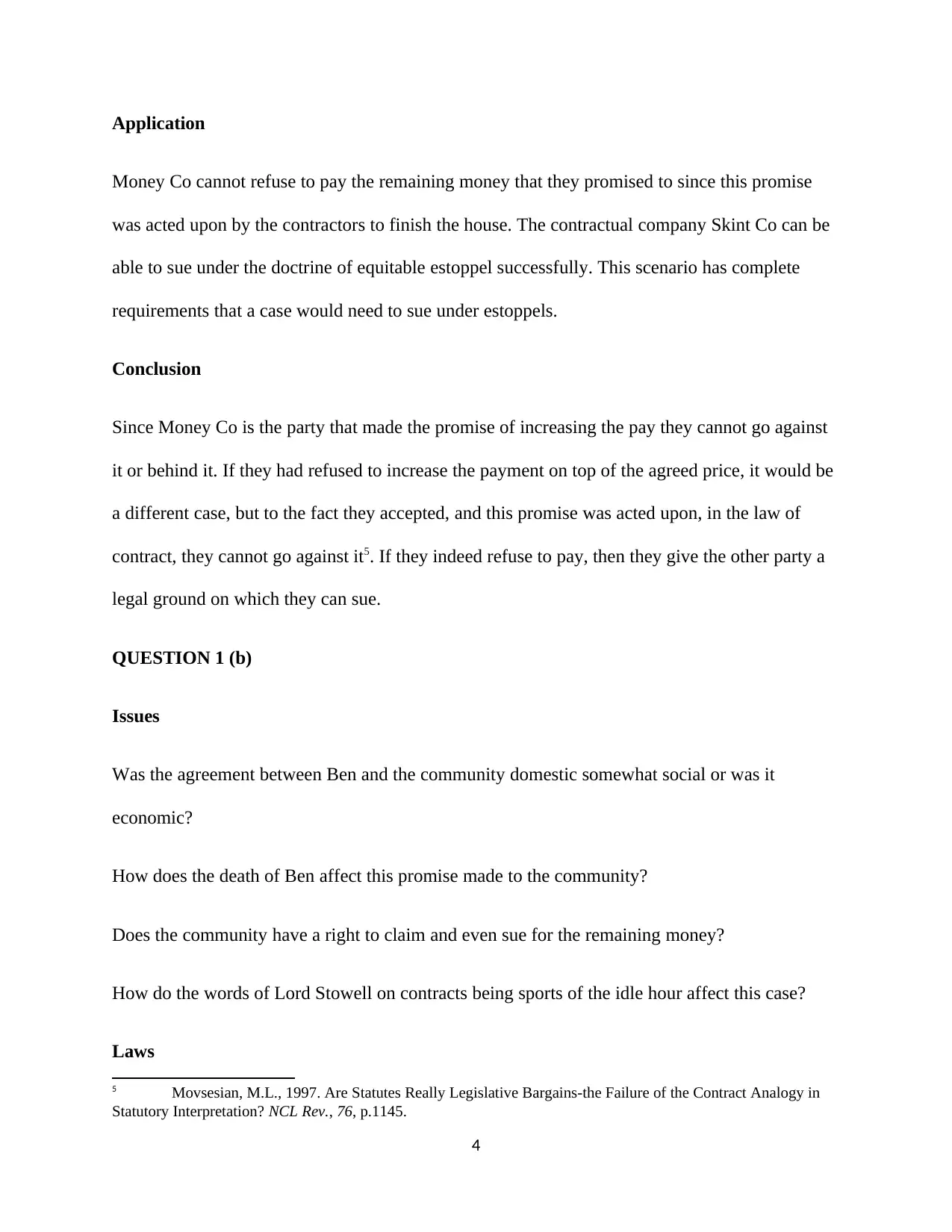
Application
Money Co cannot refuse to pay the remaining money that they promised to since this promise
was acted upon by the contractors to finish the house. The contractual company Skint Co can be
able to sue under the doctrine of equitable estoppel successfully. This scenario has complete
requirements that a case would need to sue under estoppels.
Conclusion
Since Money Co is the party that made the promise of increasing the pay they cannot go against
it or behind it. If they had refused to increase the payment on top of the agreed price, it would be
a different case, but to the fact they accepted, and this promise was acted upon, in the law of
contract, they cannot go against it5. If they indeed refuse to pay, then they give the other party a
legal ground on which they can sue.
QUESTION 1 (b)
Issues
Was the agreement between Ben and the community domestic somewhat social or was it
economic?
How does the death of Ben affect this promise made to the community?
Does the community have a right to claim and even sue for the remaining money?
How do the words of Lord Stowell on contracts being sports of the idle hour affect this case?
Laws
5 Movsesian, M.L., 1997. Are Statutes Really Legislative Bargains-the Failure of the Contract Analogy in
Statutory Interpretation? NCL Rev., 76, p.1145.
4
Money Co cannot refuse to pay the remaining money that they promised to since this promise
was acted upon by the contractors to finish the house. The contractual company Skint Co can be
able to sue under the doctrine of equitable estoppel successfully. This scenario has complete
requirements that a case would need to sue under estoppels.
Conclusion
Since Money Co is the party that made the promise of increasing the pay they cannot go against
it or behind it. If they had refused to increase the payment on top of the agreed price, it would be
a different case, but to the fact they accepted, and this promise was acted upon, in the law of
contract, they cannot go against it5. If they indeed refuse to pay, then they give the other party a
legal ground on which they can sue.
QUESTION 1 (b)
Issues
Was the agreement between Ben and the community domestic somewhat social or was it
economic?
How does the death of Ben affect this promise made to the community?
Does the community have a right to claim and even sue for the remaining money?
How do the words of Lord Stowell on contracts being sports of the idle hour affect this case?
Laws
5 Movsesian, M.L., 1997. Are Statutes Really Legislative Bargains-the Failure of the Contract Analogy in
Statutory Interpretation? NCL Rev., 76, p.1145.
4
Paraphrase This Document
Need a fresh take? Get an instant paraphrase of this document with our AI Paraphraser
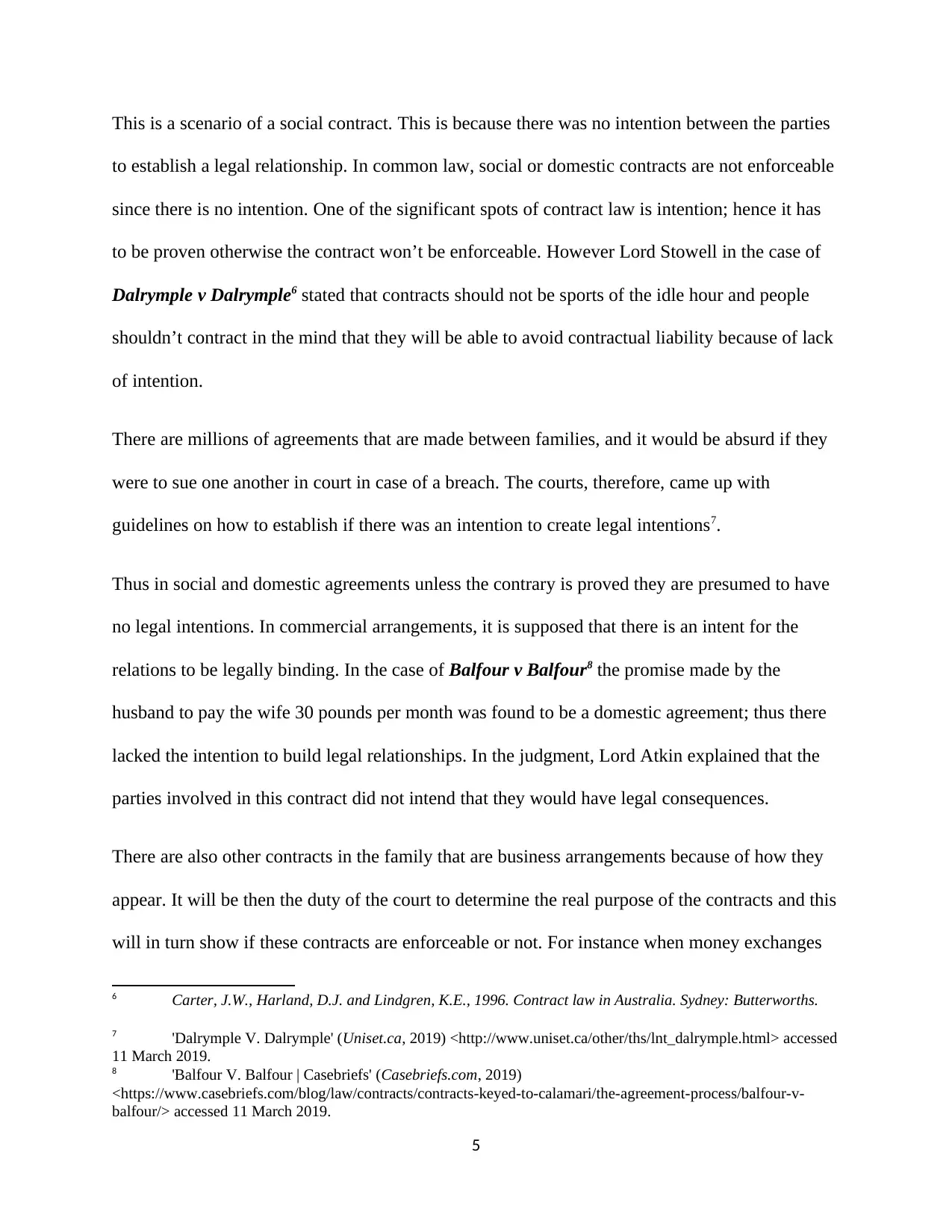
This is a scenario of a social contract. This is because there was no intention between the parties
to establish a legal relationship. In common law, social or domestic contracts are not enforceable
since there is no intention. One of the significant spots of contract law is intention; hence it has
to be proven otherwise the contract won’t be enforceable. However Lord Stowell in the case of
Dalrymple v Dalrymple6 stated that contracts should not be sports of the idle hour and people
shouldn’t contract in the mind that they will be able to avoid contractual liability because of lack
of intention.
There are millions of agreements that are made between families, and it would be absurd if they
were to sue one another in court in case of a breach. The courts, therefore, came up with
guidelines on how to establish if there was an intention to create legal intentions7.
Thus in social and domestic agreements unless the contrary is proved they are presumed to have
no legal intentions. In commercial arrangements, it is supposed that there is an intent for the
relations to be legally binding. In the case of Balfour v Balfour8 the promise made by the
husband to pay the wife 30 pounds per month was found to be a domestic agreement; thus there
lacked the intention to build legal relationships. In the judgment, Lord Atkin explained that the
parties involved in this contract did not intend that they would have legal consequences.
There are also other contracts in the family that are business arrangements because of how they
appear. It will be then the duty of the court to determine the real purpose of the contracts and this
will in turn show if these contracts are enforceable or not. For instance when money exchanges
6 Carter, J.W., Harland, D.J. and Lindgren, K.E., 1996. Contract law in Australia. Sydney: Butterworths.
7 'Dalrymple V. Dalrymple' (Uniset.ca, 2019) <http://www.uniset.ca/other/ths/lnt_dalrymple.html> accessed
11 March 2019.
8 'Balfour V. Balfour | Casebriefs' (Casebriefs.com, 2019)
<https://www.casebriefs.com/blog/law/contracts/contracts-keyed-to-calamari/the-agreement-process/balfour-v-
balfour/> accessed 11 March 2019.
5
to establish a legal relationship. In common law, social or domestic contracts are not enforceable
since there is no intention. One of the significant spots of contract law is intention; hence it has
to be proven otherwise the contract won’t be enforceable. However Lord Stowell in the case of
Dalrymple v Dalrymple6 stated that contracts should not be sports of the idle hour and people
shouldn’t contract in the mind that they will be able to avoid contractual liability because of lack
of intention.
There are millions of agreements that are made between families, and it would be absurd if they
were to sue one another in court in case of a breach. The courts, therefore, came up with
guidelines on how to establish if there was an intention to create legal intentions7.
Thus in social and domestic agreements unless the contrary is proved they are presumed to have
no legal intentions. In commercial arrangements, it is supposed that there is an intent for the
relations to be legally binding. In the case of Balfour v Balfour8 the promise made by the
husband to pay the wife 30 pounds per month was found to be a domestic agreement; thus there
lacked the intention to build legal relationships. In the judgment, Lord Atkin explained that the
parties involved in this contract did not intend that they would have legal consequences.
There are also other contracts in the family that are business arrangements because of how they
appear. It will be then the duty of the court to determine the real purpose of the contracts and this
will in turn show if these contracts are enforceable or not. For instance when money exchanges
6 Carter, J.W., Harland, D.J. and Lindgren, K.E., 1996. Contract law in Australia. Sydney: Butterworths.
7 'Dalrymple V. Dalrymple' (Uniset.ca, 2019) <http://www.uniset.ca/other/ths/lnt_dalrymple.html> accessed
11 March 2019.
8 'Balfour V. Balfour | Casebriefs' (Casebriefs.com, 2019)
<https://www.casebriefs.com/blog/law/contracts/contracts-keyed-to-calamari/the-agreement-process/balfour-v-
balfour/> accessed 11 March 2019.
5
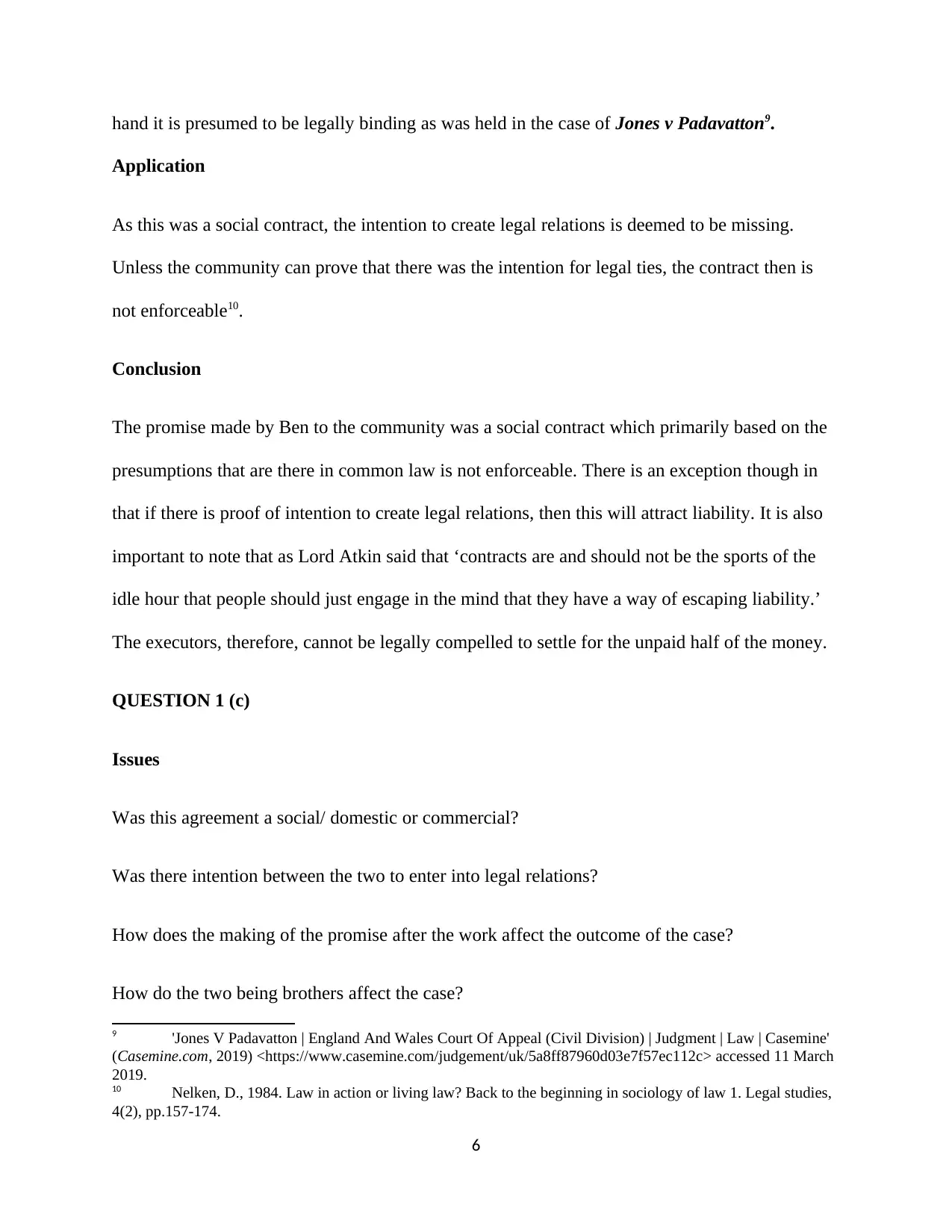
hand it is presumed to be legally binding as was held in the case of Jones v Padavatton9.
Application
As this was a social contract, the intention to create legal relations is deemed to be missing.
Unless the community can prove that there was the intention for legal ties, the contract then is
not enforceable10.
Conclusion
The promise made by Ben to the community was a social contract which primarily based on the
presumptions that are there in common law is not enforceable. There is an exception though in
that if there is proof of intention to create legal relations, then this will attract liability. It is also
important to note that as Lord Atkin said that ‘contracts are and should not be the sports of the
idle hour that people should just engage in the mind that they have a way of escaping liability.’
The executors, therefore, cannot be legally compelled to settle for the unpaid half of the money.
QUESTION 1 (c)
Issues
Was this agreement a social/ domestic or commercial?
Was there intention between the two to enter into legal relations?
How does the making of the promise after the work affect the outcome of the case?
How do the two being brothers affect the case?
9 'Jones V Padavatton | England And Wales Court Of Appeal (Civil Division) | Judgment | Law | Casemine'
(Casemine.com, 2019) <https://www.casemine.com/judgement/uk/5a8ff87960d03e7f57ec112c> accessed 11 March
2019.
10 Nelken, D., 1984. Law in action or living law? Back to the beginning in sociology of law 1. Legal studies,
4(2), pp.157-174.
6
Application
As this was a social contract, the intention to create legal relations is deemed to be missing.
Unless the community can prove that there was the intention for legal ties, the contract then is
not enforceable10.
Conclusion
The promise made by Ben to the community was a social contract which primarily based on the
presumptions that are there in common law is not enforceable. There is an exception though in
that if there is proof of intention to create legal relations, then this will attract liability. It is also
important to note that as Lord Atkin said that ‘contracts are and should not be the sports of the
idle hour that people should just engage in the mind that they have a way of escaping liability.’
The executors, therefore, cannot be legally compelled to settle for the unpaid half of the money.
QUESTION 1 (c)
Issues
Was this agreement a social/ domestic or commercial?
Was there intention between the two to enter into legal relations?
How does the making of the promise after the work affect the outcome of the case?
How do the two being brothers affect the case?
9 'Jones V Padavatton | England And Wales Court Of Appeal (Civil Division) | Judgment | Law | Casemine'
(Casemine.com, 2019) <https://www.casemine.com/judgement/uk/5a8ff87960d03e7f57ec112c> accessed 11 March
2019.
10 Nelken, D., 1984. Law in action or living law? Back to the beginning in sociology of law 1. Legal studies,
4(2), pp.157-174.
6
⊘ This is a preview!⊘
Do you want full access?
Subscribe today to unlock all pages.

Trusted by 1+ million students worldwide
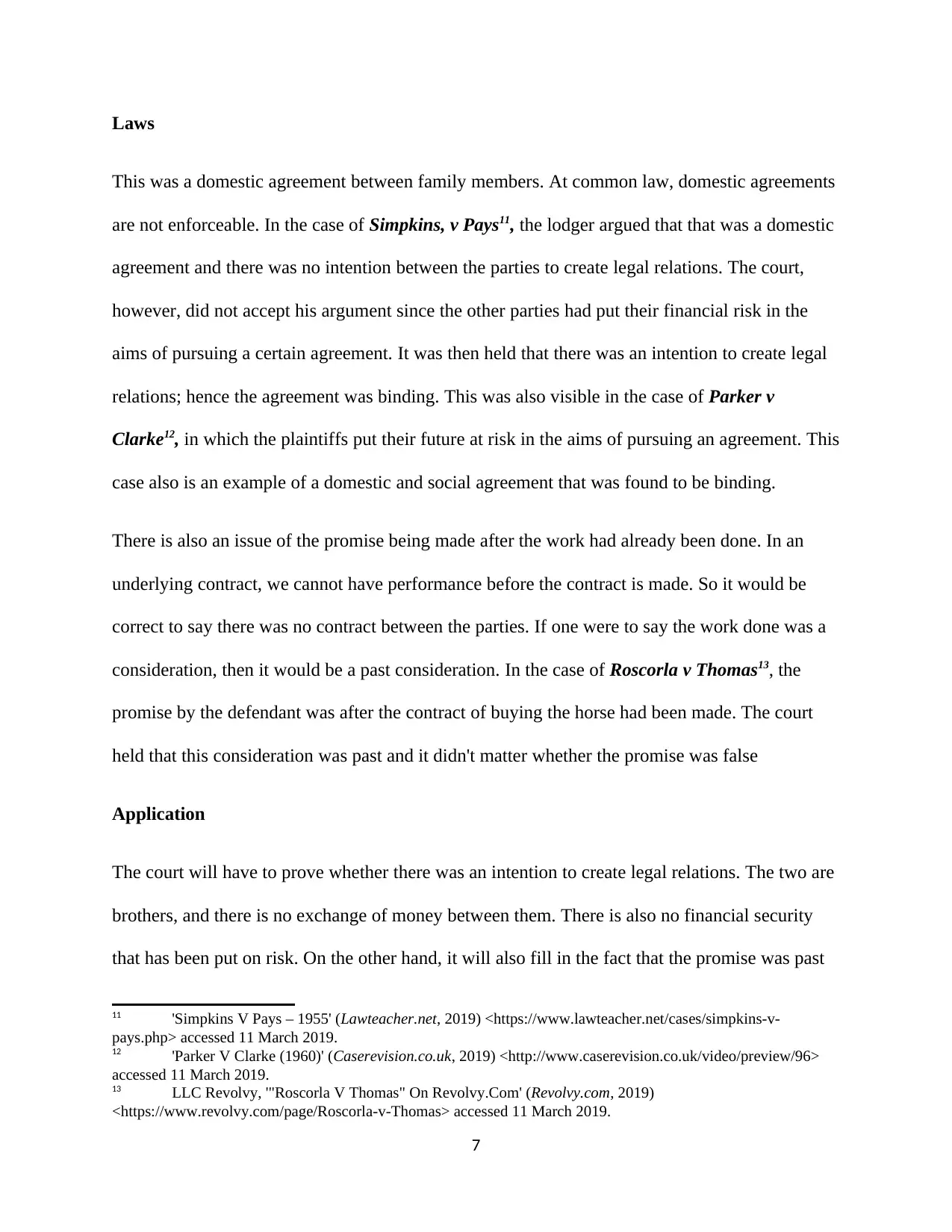
Laws
This was a domestic agreement between family members. At common law, domestic agreements
are not enforceable. In the case of Simpkins, v Pays11, the lodger argued that that was a domestic
agreement and there was no intention between the parties to create legal relations. The court,
however, did not accept his argument since the other parties had put their financial risk in the
aims of pursuing a certain agreement. It was then held that there was an intention to create legal
relations; hence the agreement was binding. This was also visible in the case of Parker v
Clarke12, in which the plaintiffs put their future at risk in the aims of pursuing an agreement. This
case also is an example of a domestic and social agreement that was found to be binding.
There is also an issue of the promise being made after the work had already been done. In an
underlying contract, we cannot have performance before the contract is made. So it would be
correct to say there was no contract between the parties. If one were to say the work done was a
consideration, then it would be a past consideration. In the case of Roscorla v Thomas13, the
promise by the defendant was after the contract of buying the horse had been made. The court
held that this consideration was past and it didn't matter whether the promise was false
Application
The court will have to prove whether there was an intention to create legal relations. The two are
brothers, and there is no exchange of money between them. There is also no financial security
that has been put on risk. On the other hand, it will also fill in the fact that the promise was past
11 'Simpkins V Pays – 1955' (Lawteacher.net, 2019) <https://www.lawteacher.net/cases/simpkins-v-
pays.php> accessed 11 March 2019.
12 'Parker V Clarke (1960)' (Caserevision.co.uk, 2019) <http://www.caserevision.co.uk/video/preview/96>
accessed 11 March 2019.
13 LLC Revolvy, '"Roscorla V Thomas" On Revolvy.Com' (Revolvy.com, 2019)
<https://www.revolvy.com/page/Roscorla-v-Thomas> accessed 11 March 2019.
7
This was a domestic agreement between family members. At common law, domestic agreements
are not enforceable. In the case of Simpkins, v Pays11, the lodger argued that that was a domestic
agreement and there was no intention between the parties to create legal relations. The court,
however, did not accept his argument since the other parties had put their financial risk in the
aims of pursuing a certain agreement. It was then held that there was an intention to create legal
relations; hence the agreement was binding. This was also visible in the case of Parker v
Clarke12, in which the plaintiffs put their future at risk in the aims of pursuing an agreement. This
case also is an example of a domestic and social agreement that was found to be binding.
There is also an issue of the promise being made after the work had already been done. In an
underlying contract, we cannot have performance before the contract is made. So it would be
correct to say there was no contract between the parties. If one were to say the work done was a
consideration, then it would be a past consideration. In the case of Roscorla v Thomas13, the
promise by the defendant was after the contract of buying the horse had been made. The court
held that this consideration was past and it didn't matter whether the promise was false
Application
The court will have to prove whether there was an intention to create legal relations. The two are
brothers, and there is no exchange of money between them. There is also no financial security
that has been put on risk. On the other hand, it will also fill in the fact that the promise was past
11 'Simpkins V Pays – 1955' (Lawteacher.net, 2019) <https://www.lawteacher.net/cases/simpkins-v-
pays.php> accessed 11 March 2019.
12 'Parker V Clarke (1960)' (Caserevision.co.uk, 2019) <http://www.caserevision.co.uk/video/preview/96>
accessed 11 March 2019.
13 LLC Revolvy, '"Roscorla V Thomas" On Revolvy.Com' (Revolvy.com, 2019)
<https://www.revolvy.com/page/Roscorla-v-Thomas> accessed 11 March 2019.
7
Paraphrase This Document
Need a fresh take? Get an instant paraphrase of this document with our AI Paraphraser
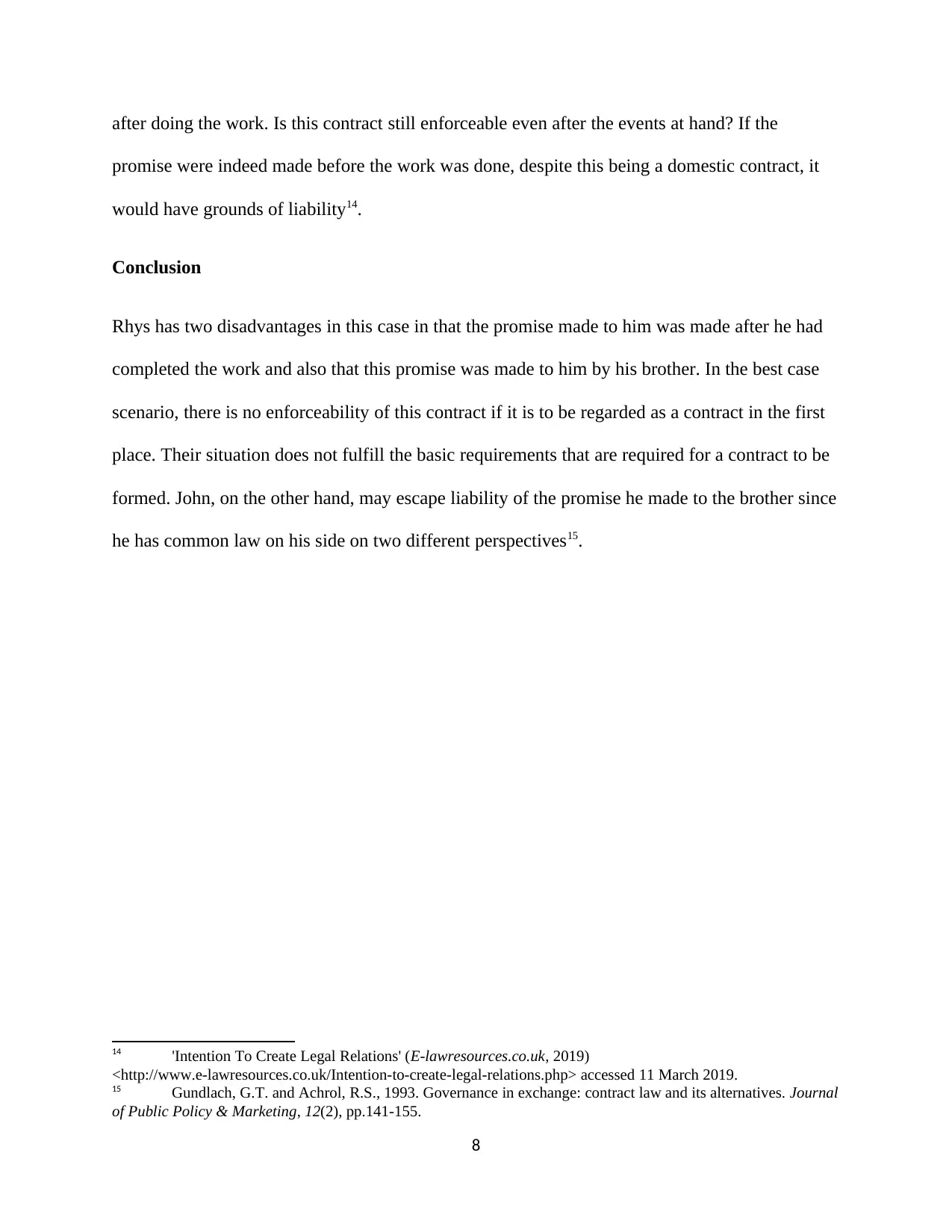
after doing the work. Is this contract still enforceable even after the events at hand? If the
promise were indeed made before the work was done, despite this being a domestic contract, it
would have grounds of liability14.
Conclusion
Rhys has two disadvantages in this case in that the promise made to him was made after he had
completed the work and also that this promise was made to him by his brother. In the best case
scenario, there is no enforceability of this contract if it is to be regarded as a contract in the first
place. Their situation does not fulfill the basic requirements that are required for a contract to be
formed. John, on the other hand, may escape liability of the promise he made to the brother since
he has common law on his side on two different perspectives15.
14 'Intention To Create Legal Relations' (E-lawresources.co.uk, 2019)
<http://www.e-lawresources.co.uk/Intention-to-create-legal-relations.php> accessed 11 March 2019.
15 Gundlach, G.T. and Achrol, R.S., 1993. Governance in exchange: contract law and its alternatives. Journal
of Public Policy & Marketing, 12(2), pp.141-155.
8
promise were indeed made before the work was done, despite this being a domestic contract, it
would have grounds of liability14.
Conclusion
Rhys has two disadvantages in this case in that the promise made to him was made after he had
completed the work and also that this promise was made to him by his brother. In the best case
scenario, there is no enforceability of this contract if it is to be regarded as a contract in the first
place. Their situation does not fulfill the basic requirements that are required for a contract to be
formed. John, on the other hand, may escape liability of the promise he made to the brother since
he has common law on his side on two different perspectives15.
14 'Intention To Create Legal Relations' (E-lawresources.co.uk, 2019)
<http://www.e-lawresources.co.uk/Intention-to-create-legal-relations.php> accessed 11 March 2019.
15 Gundlach, G.T. and Achrol, R.S., 1993. Governance in exchange: contract law and its alternatives. Journal
of Public Policy & Marketing, 12(2), pp.141-155.
8
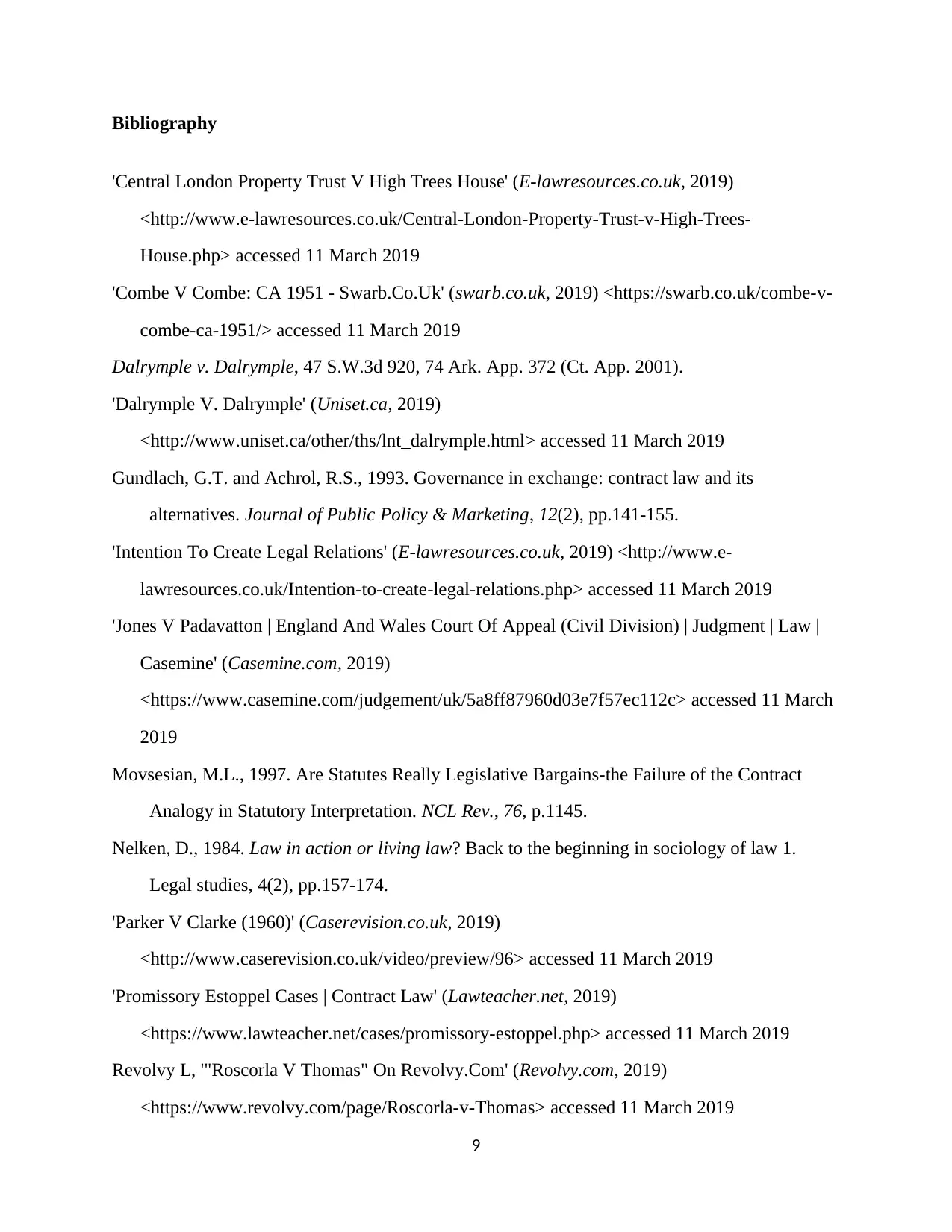
Bibliography
'Central London Property Trust V High Trees House' (E-lawresources.co.uk, 2019)
<http://www.e-lawresources.co.uk/Central-London-Property-Trust-v-High-Trees-
House.php> accessed 11 March 2019
'Combe V Combe: CA 1951 - Swarb.Co.Uk' (swarb.co.uk, 2019) <https://swarb.co.uk/combe-v-
combe-ca-1951/> accessed 11 March 2019
Dalrymple v. Dalrymple, 47 S.W.3d 920, 74 Ark. App. 372 (Ct. App. 2001).
'Dalrymple V. Dalrymple' (Uniset.ca, 2019)
<http://www.uniset.ca/other/ths/lnt_dalrymple.html> accessed 11 March 2019
Gundlach, G.T. and Achrol, R.S., 1993. Governance in exchange: contract law and its
alternatives. Journal of Public Policy & Marketing, 12(2), pp.141-155.
'Intention To Create Legal Relations' (E-lawresources.co.uk, 2019) <http://www.e-
lawresources.co.uk/Intention-to-create-legal-relations.php> accessed 11 March 2019
'Jones V Padavatton | England And Wales Court Of Appeal (Civil Division) | Judgment | Law |
Casemine' (Casemine.com, 2019)
<https://www.casemine.com/judgement/uk/5a8ff87960d03e7f57ec112c> accessed 11 March
2019
Movsesian, M.L., 1997. Are Statutes Really Legislative Bargains-the Failure of the Contract
Analogy in Statutory Interpretation. NCL Rev., 76, p.1145.
Nelken, D., 1984. Law in action or living law? Back to the beginning in sociology of law 1.
Legal studies, 4(2), pp.157-174.
'Parker V Clarke (1960)' (Caserevision.co.uk, 2019)
<http://www.caserevision.co.uk/video/preview/96> accessed 11 March 2019
'Promissory Estoppel Cases | Contract Law' (Lawteacher.net, 2019)
<https://www.lawteacher.net/cases/promissory-estoppel.php> accessed 11 March 2019
Revolvy L, '"Roscorla V Thomas" On Revolvy.Com' (Revolvy.com, 2019)
<https://www.revolvy.com/page/Roscorla-v-Thomas> accessed 11 March 2019
9
'Central London Property Trust V High Trees House' (E-lawresources.co.uk, 2019)
<http://www.e-lawresources.co.uk/Central-London-Property-Trust-v-High-Trees-
House.php> accessed 11 March 2019
'Combe V Combe: CA 1951 - Swarb.Co.Uk' (swarb.co.uk, 2019) <https://swarb.co.uk/combe-v-
combe-ca-1951/> accessed 11 March 2019
Dalrymple v. Dalrymple, 47 S.W.3d 920, 74 Ark. App. 372 (Ct. App. 2001).
'Dalrymple V. Dalrymple' (Uniset.ca, 2019)
<http://www.uniset.ca/other/ths/lnt_dalrymple.html> accessed 11 March 2019
Gundlach, G.T. and Achrol, R.S., 1993. Governance in exchange: contract law and its
alternatives. Journal of Public Policy & Marketing, 12(2), pp.141-155.
'Intention To Create Legal Relations' (E-lawresources.co.uk, 2019) <http://www.e-
lawresources.co.uk/Intention-to-create-legal-relations.php> accessed 11 March 2019
'Jones V Padavatton | England And Wales Court Of Appeal (Civil Division) | Judgment | Law |
Casemine' (Casemine.com, 2019)
<https://www.casemine.com/judgement/uk/5a8ff87960d03e7f57ec112c> accessed 11 March
2019
Movsesian, M.L., 1997. Are Statutes Really Legislative Bargains-the Failure of the Contract
Analogy in Statutory Interpretation. NCL Rev., 76, p.1145.
Nelken, D., 1984. Law in action or living law? Back to the beginning in sociology of law 1.
Legal studies, 4(2), pp.157-174.
'Parker V Clarke (1960)' (Caserevision.co.uk, 2019)
<http://www.caserevision.co.uk/video/preview/96> accessed 11 March 2019
'Promissory Estoppel Cases | Contract Law' (Lawteacher.net, 2019)
<https://www.lawteacher.net/cases/promissory-estoppel.php> accessed 11 March 2019
Revolvy L, '"Roscorla V Thomas" On Revolvy.Com' (Revolvy.com, 2019)
<https://www.revolvy.com/page/Roscorla-v-Thomas> accessed 11 March 2019
9
⊘ This is a preview!⊘
Do you want full access?
Subscribe today to unlock all pages.

Trusted by 1+ million students worldwide

'Simpkins V Pays – 1955' (Lawteacher.net, 2019) <https://www.lawteacher.net/cases/simpkins-
v-pays.php> accessed 11 March 2019
US Legal I, 'Estoppel Law And Legal Definition | Uslegal, Inc.' (Definitions.uslegal.com, 2019)
<https://definitions.uslegal.com/e/estoppel/> accessed 11 March 2019
10
v-pays.php> accessed 11 March 2019
US Legal I, 'Estoppel Law And Legal Definition | Uslegal, Inc.' (Definitions.uslegal.com, 2019)
<https://definitions.uslegal.com/e/estoppel/> accessed 11 March 2019
10
1 out of 10
Related Documents
Your All-in-One AI-Powered Toolkit for Academic Success.
+13062052269
info@desklib.com
Available 24*7 on WhatsApp / Email
![[object Object]](/_next/static/media/star-bottom.7253800d.svg)
Unlock your academic potential
Copyright © 2020–2026 A2Z Services. All Rights Reserved. Developed and managed by ZUCOL.





